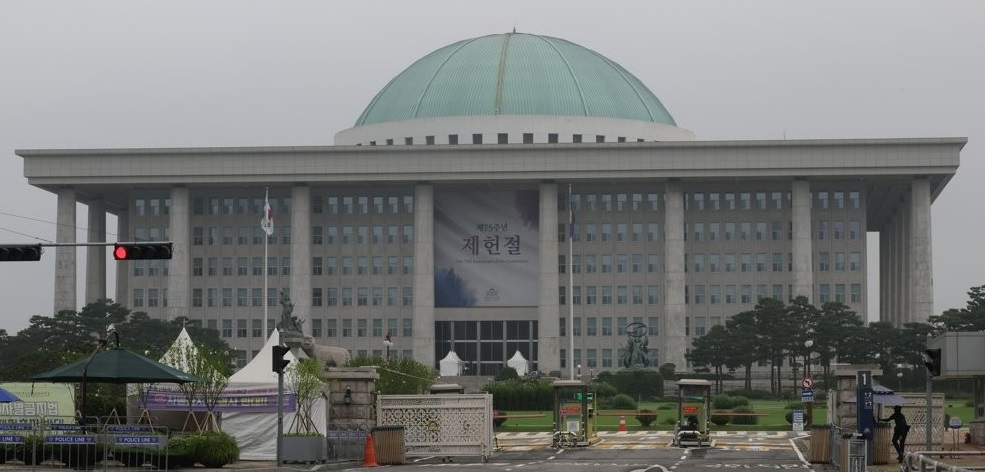 |
The National Assembly building in Yeouido, western Seoul (Yonhap) |
Several key bills aimed to provide stronger social safety nets and confirm next year’s budget plan were stuck in limbo as of Monday, as rival parties continued to lock horns ahead of the general elections in April.
With less than a week remaining for the plenary session of the 21st National Assembly, observers expressed concern that the bills could be scrapped altogether, with the ruling People Power Party and the main opposition Democratic Party of Korea remaining in a standoff.
"We ask the National Assembly to swiftly deal with the pending bills aimed to improve the livelihoods of the people and the country's economy alongside next year's budget plan in response to the desperate voices of the public," Prime Minister Han Duk-woo said Sunday.
In response to the growing concerns, the rival parties jointly launched a task force of ranking officials Monday to deal with the delayed bills and the adoption of new laws.
Two bills drawn up to adopt harsher punishments for real estate scammers and those who post death threats online, respectively, alongside one that allows bereaved families of policemen and soldiers to legally file a lawsuit against the government for compensation, are among the plans that face delays.
The revision to the Act on the Aggravated Punishment of Specific Crimes, which pushes to expand those subject to the law, has been stuck in the early stages of parliamentary review for over six months.
If the National Assembly decides to pass the bill, which was proposed by a ruling party lawmaker in April, white-collar criminals who have inflicted financial damages below 500 million won ($383,300) each on multiple victims would be subject to heavier punishment. The current law only applies to those who have inflicted damages worth more than 500 million won, which can lead to at least three years in prison.
A loophole in the law has allowed scammers who took advantage of the country’s unique “jeonse” housing rental system in recent years to escape heavy punishment.
Under the nation’s jeonse system, tenants pay a large lump-sum deposit to the landlord. The deposit -- usually below 500 million won -- is returned at the end of the rental agreement. which normally lasts two years. The tenants are not required to pay separate rental fees during the lease period.
The total value of disputes surrounding the jeonse system hit 1.2 trillion won in 2022, doubling from a year earlier, according to the recent data compiled by the Ministry of Finance.
The three bills are among a total of 55 bills that currently await the assessment of the National Assembly. By law, the bills will be scrapped automatically with the launch of the 22nd National Assembly slated for late May 2024.
Meanwhile, lawmakers have been postponing the passage of the 2024 government budget, missing its legal deadline of Dec. 2. This marks the third consecutive year the National Assembly failed to uphold the legal deadline for the budget.
The delay comes as the tension between the rival parties intensified in the process leading up to the state broadcasting chief’s resignation on Dec. 1.
President Yoon Suk Yeol granted his approval for the resignation offered by Korea Communications Commission Chairman Lee Dong-kwan, who was the subject of possible impeachment.
The main opposition party introduced a unilateral motion to impeach Lee last week based on its longstanding criticism of him "cracking down on outlets for hostile coverage against the government" and aiding the president’s "efforts to control the press."
Yoon’s move effectively derailed the main opposition party's plans to proceed with an impeachment motion originally scheduled for the afternoon of Dec. 1.
The ruling party floor leader Rep. Yun Jae-ok criticized the Democratic Party's move on Monday, calling it an attempt to "paralyze and suspend the Korea Communication Commission's functions to gain an upper hand in the general elections next year."







